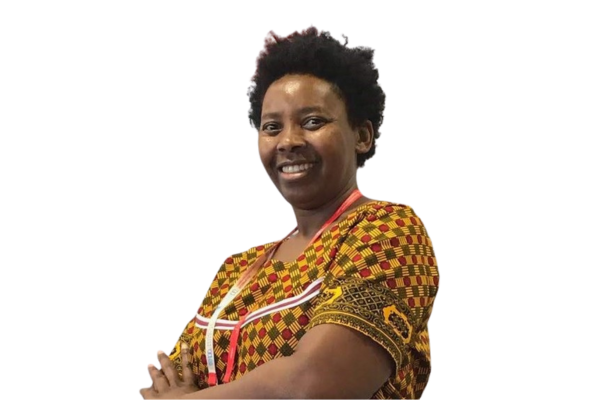We asked women leaders about the impact of the COVID-19 pandemic and lockdown on their activism. Here’s what Lorraine Ndlovu, president of the Zimbabwe Chamber of Informal Economy Associations and StreetNet International, had to say.
How is ZCIEA supporting its members in dealing with the impact of the pandemic?
The members of the Zimbabwe Chamber of Informal Economy Associations (ZCIEA) include street and market vendors, construction workers, waste pickers, and other workers in the informal economy. Our approach involves organising, educating, advocating, empowering, and representing our members in both rural and urban areas.
When the COVID-19 pandemic struck, we couldn’t continue as usual. People were worried about their safety, the safety of their families, and what the future held post-COVID-19. The members of ZCIEA, who work in public spaces, were particularly affected by the lockdown. However, we found ways to stay connected. Many members were shocked, immobilised, and desperate. The avalanche of messages I received had a common theme: “President, we have nothing. Our children haven’t eaten. What shall we do? What will ZCIEA do?”
Although ZCIEA doesn’t have an emergency fund for crises like COVID-19, we couldn’t ignore the appeals from our members. We consulted our partners and adjusted existing programs to assist. We set up a small relief fund and disbursed money via cell phones to about 1,890 members in 42 areas so far. This ongoing support has helped our members afford at least a bag of mealie meal. Women became more innovative and began working from home. We distributed personal protective equipment and shared information on safety precautions to take at home. We also encouraged members to disseminate this information widely.
Our work is carried out against a backdrop of negative attitudes among citizens about the government’s ability to deliver the promised COVID-19 response aid. Globally, informal sector workers are among the most affected by the pandemic. We are seeking additional resources to continue supporting our members during and after the pandemic.
What does transformative feminist leadership mean for you in the context of the COVID-19 pandemic?
Transformative feminist leadership is reflective and seeks to understand the context at all times. The impact of the COVID-19 pandemic on the care economy starkly reminds us that many women are still excluded from leadership, decision-making, and national activism. Women are often not invited to participate in important discussions due to the assumption that we are ‘busy’ and unavailable. The shift to online communication platforms has highlighted the issue of exclusion and the tendency for some men to hijack women’s issues, claiming to speak on our behalf. In face-to-face meetings, we can confront men directly and shame them into adopting the appropriate postures. However, this strategy may not be effective in online meetings.
Many gender-sensitive men in society participate in care work and help alleviate suffering during crises. However, there is an assumption that they will also represent women’s issues and speak on our behalf. I have seen a lot of representation of women’s issues in male-dominated spaces, both offline and online. I find this an affront to women, and I would rather not participate in such spaces. As women and feminists, we should demand proper gender representation on all platforms, especially those dealing with women’s issues.
Has the pandemic stimulated thinking on alternative models of leadership that aren't militaristic or patriarchal?
The pandemic has highlighted the resilience of women and their knack for planning, implementing, and making an impact. Yet, many of us aren’t claiming our successes.
We've been socialised to think that talking about ourselves is "beating our own drum." This patriarchal approach pacifies women, preventing us from claiming our achievements and highlighting our successes. I can beat my drum because I know the rhythm I want to dance to. So I began to write about myself to claim and share my successes and to document my work for evidence.
Women need to start talking about their successes more and documenting their work. Social media platforms can be powerful tools for communicating, documenting, and sharing our work. When a fellow sister makes a presentation, take a picture of her and write something small to post on Facebook or Twitter. This creates documentation and evidence of the impact of our work on the people we serve.
We need more women in leadership positions. This requires more support and investment in advocacy and education programs to nurture a pipeline of strong women leaders. In the absence of a formal education foundation, women can be supported to learn from each other and become effective leaders. Our voices and opinions will continue to be heard in the right spaces—spaces that are free from the keepers of the status quo.
We need an alternative model of leadership going forward. We must dismiss the ‘pull-down syndrome’ label and remain defiant in our support of each other. I have learned that to be an effective leader, I need to first claim my space and assert myself, recognising that I have great ideas that should be valued and not dismissed. We have the uphill task of organising women and creating safe spaces to discuss issues that directly affect us. Spaces for building transformative and feminist leadership are more important than ever. The new model of women’s leadership that we seek will have strong support, capacity, and solidarity.







